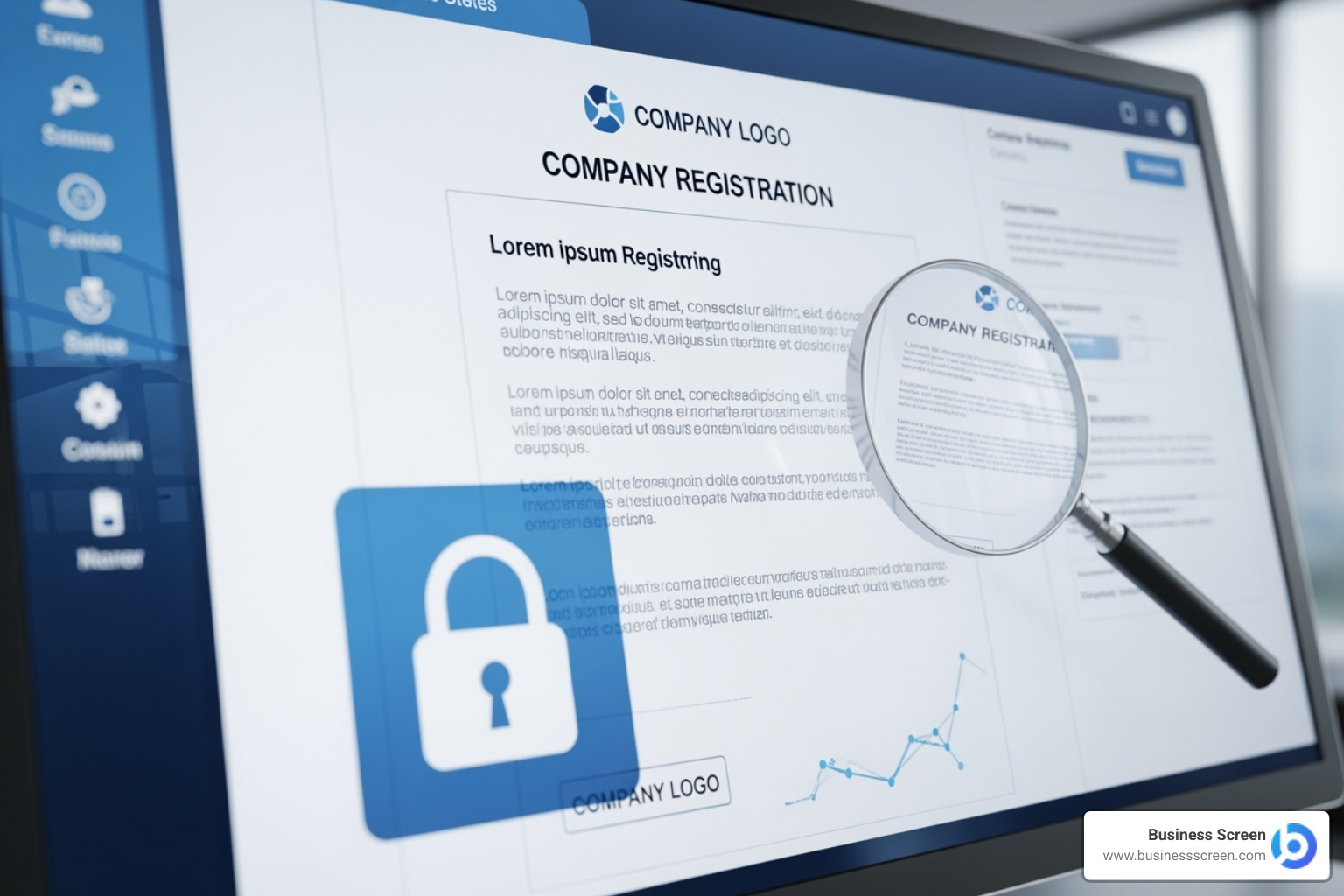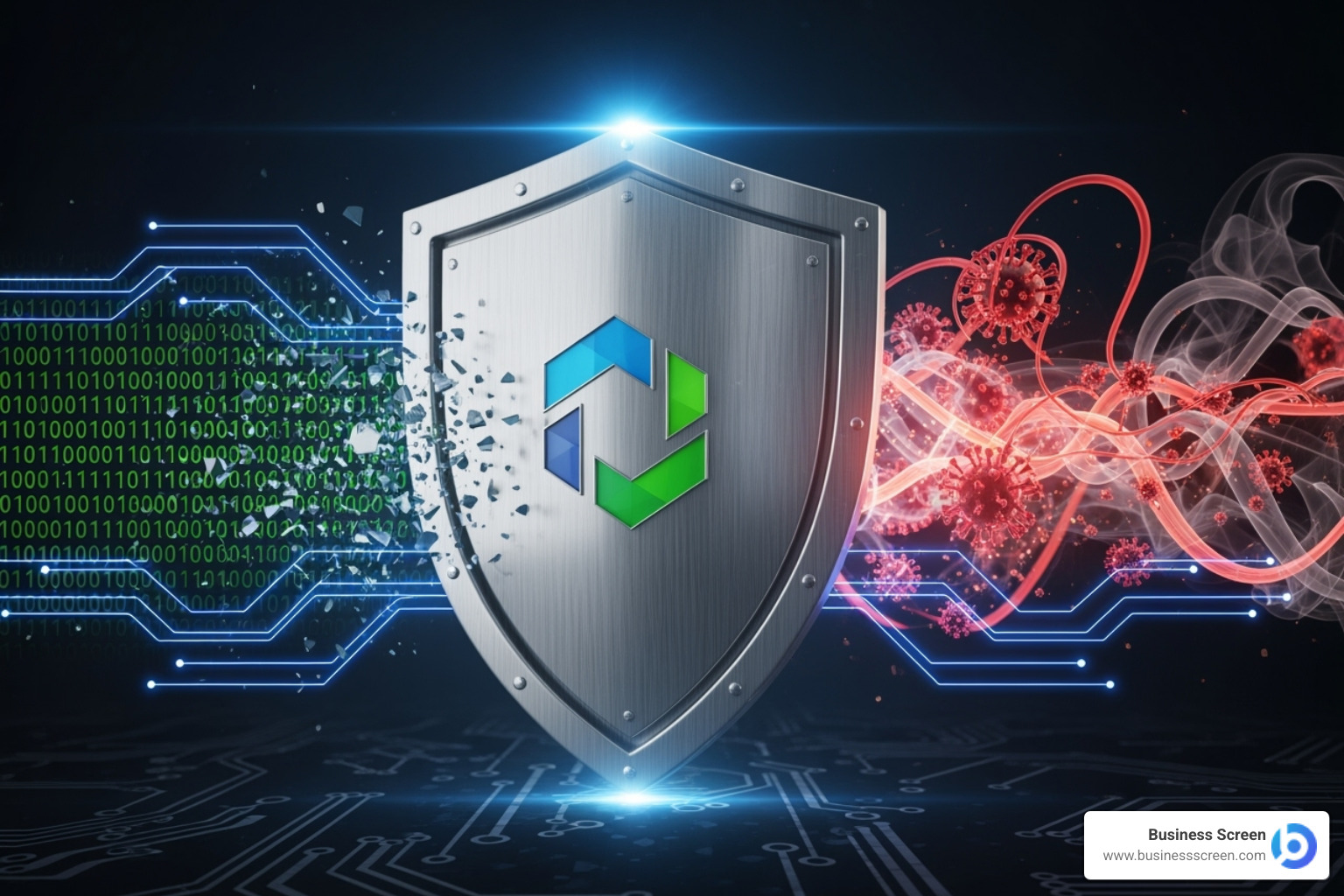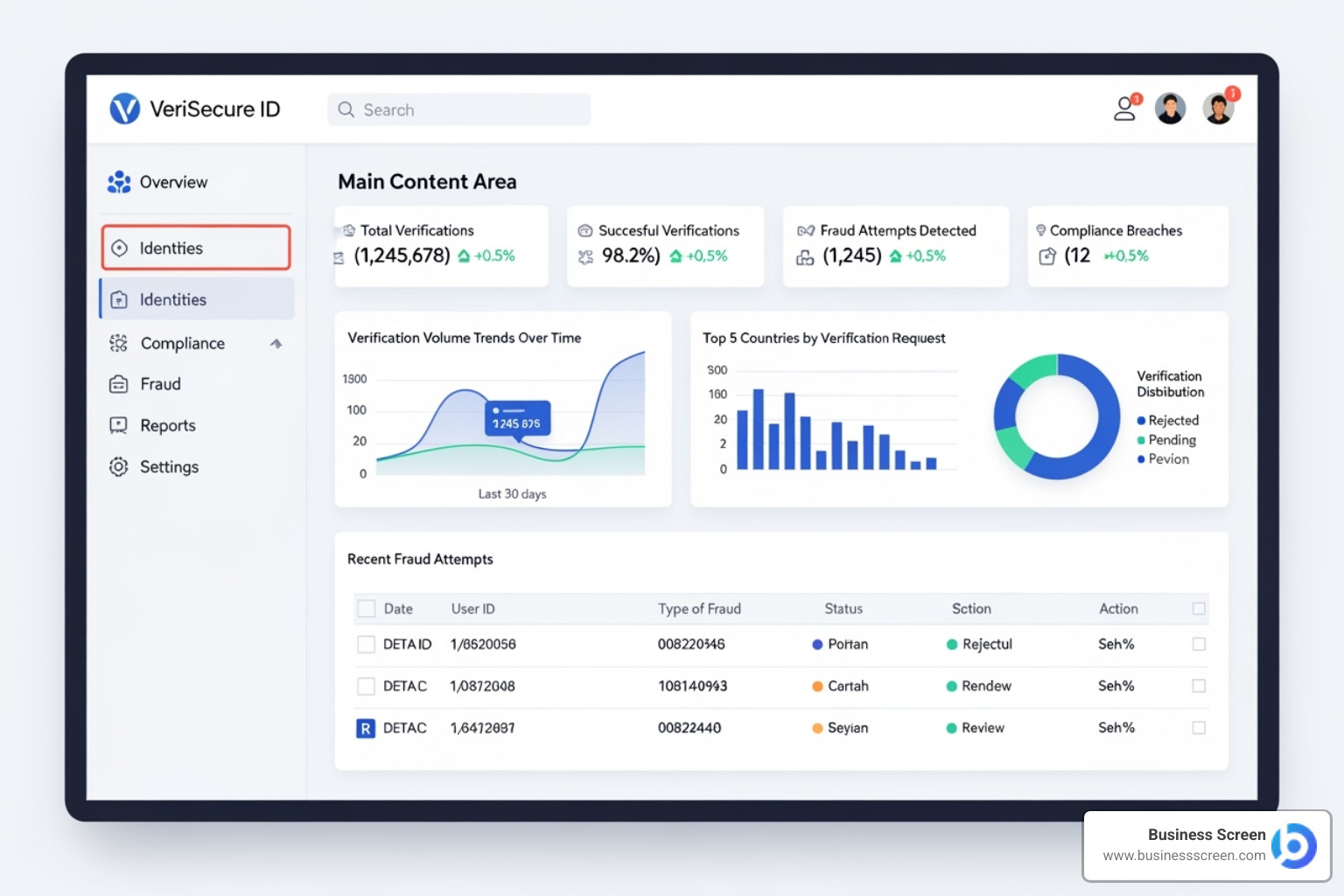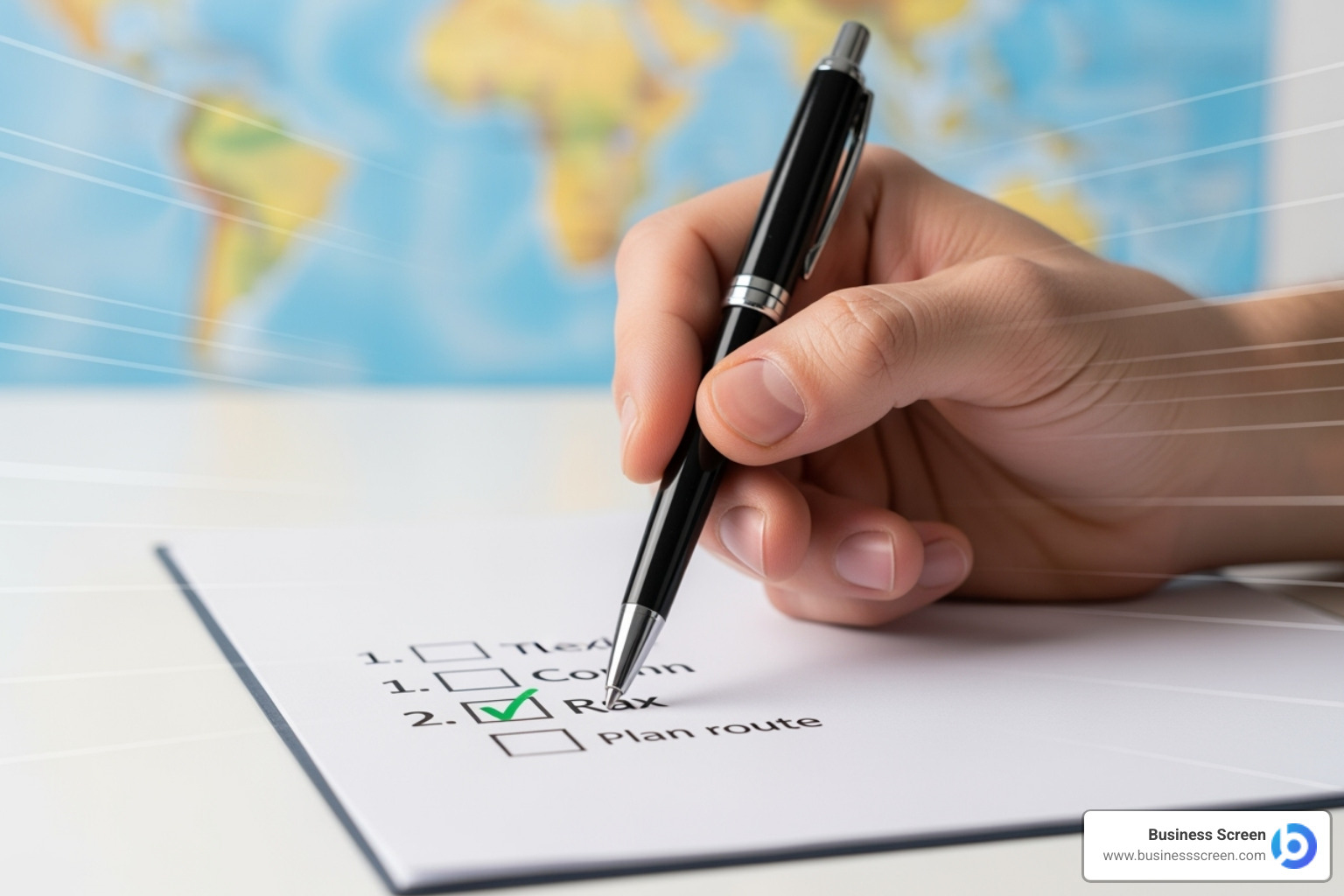
Combat fraud & build trust. See how Company identity verification ensures compliance and strengthens vital business relationships.

Company identity verification is the process of confirming that a business entity is legitimate, properly registered, and accurately represented in all transactions and partnerships. This critical due diligence step involves verifying corporate documents, ownership structures, regulatory compliance status, and operational legitimacy to prevent fraud and ensure regulatory compliance.
Key components of company identity verification include:
The stakes have never been higher. Implementing comprehensive identity verification is a significant investment that can save millions in fraud prevention costs. Meanwhile, businesses that skip proper verification face devastating consequences - from regulatory fines to partnership disasters that can destroy decades of reputation building.
Gartner defines identity verification as "the combination of activities during a digital interaction that brings a real-world identity claim within organizational risk tolerances." But for business leaders, it's simpler than that: it's your shield against bad actors who want to exploit your trust. Fraud attempts are becoming more sophisticated every day, with deepfakes, synthetic identities, and forged documents becoming daily threats.
I'm Ben Drellishak, and I help businesses avoid bad deals and shady partnerships through comprehensive risk assessments and company identity verification services. As owner of Business Screen, I've seen how proper verification prevents costly mistakes and protects business relationships.

Think of your business reputation as a castle. You've spent years building those walls, stone by stone. But in today's digital world, one bad partnership or fraudulent interaction can bring those walls crashing down faster than you can say "data breach."

That's where company identity verification becomes your shield. It's not just about checking boxes on a compliance form - it's about protecting everything you've worked to build while opening doors to legitimate opportunities.
At Business Screen, we've seen businesses dodge million-dollar bullets simply because they took the time to verify who they were dealing with. We've also watched companies learn expensive lessons when they skipped this crucial step. The difference? Smart verification practices that prevent fraud, build genuine trust with partners and customers, secure your place in the digital economy, and protect your brand reputation from costly mistakes.
When you're wondering whether a potential partner passes the smell test, our guide on How to Check if a Business is Legit gives you the roadmap.
Business fraud has evolved far beyond bad checks. Today's fraudsters use sophisticated methods to exploit businesses. We're dealing with synthetic identities—fake personas built from real and fabricated information—that can fool basic checks. Deepfakes create convincing but false video evidence, account takeover schemes hijack legitimate business accounts, and forged documents are often indistinguishable from the real thing to the naked eye.
These are everyday threats. Combating them requires robust verification processes that can spot the subtle red flags associated with these advanced fraud techniques, helping to significantly reduce fraud losses.
Let's talk about alphabet soup - KYC, KYB, and AML. These aren't just regulatory buzzwords designed to make compliance officers feel important. They're your business's insurance policy against getting tangled up with money launderers, terrorists, and other unsavory characters.
Know Your Customer (KYC) verifies that individual customers are who they claim to be. Know Your Business (KYB) does the same thing for companies - making sure they're real, legitimate entities and not shell companies designed to hide illegal activity. Anti-Money Laundering (AML) procedures help you avoid becoming an unwitting participant in financial crimes.
Understanding how these work together is crucial for any business. Our deep dive into KYB/KYC/KYCC: Why It Matters breaks down why these processes are interconnected and equally important.
PEP & Sanctions screening adds another layer of protection by checking whether you're dealing with politically exposed persons or entities on global sanctions lists. This isn't just good practice - it's legally required in many industries and jurisdictions.
Then there's the privacy angle. GDPR and CCPA regulations mean you need to handle personal data with extreme care during verification processes. The good news? Proper verification systems are designed with these privacy requirements built in from the ground up.
When you need help navigating these compliance requirements, our Legal Compliance Check service takes the guesswork out of staying on the right side of regulations.
Here's something most people don't realize: verification isn't just about keeping bad actors out. It's about building stronger relationships with the good ones.
When you conduct thorough Vendor Due Diligence, you're not just protecting yourself from risk - you're demonstrating that you take partnerships seriously. Legitimate vendors appreciate working with companies that do their homework.
The same principle applies to Customer Due Diligence. When you understand who your customers really are, you can serve them better while protecting your business from potential problems down the road.
Mergers & Acquisitions represent the ultimate trust test. You're not just buying a company - you're inheriting everything that comes with it, including any skeletons in the closet. Thorough verification during M&A due diligence can save you from costly surprises and help build investor confidence in your decision-making process.
At Business Screen, our investigator-led approach goes beyond automated checks. We provide real-time, globally-reaching reports that give you the complete picture of who you're dealing with. This comprehensive understanding helps you make better decisions and build relationships based on verified trust rather than blind faith.
If you're wondering whether due diligence is worth the investment, our article What is a Due Diligence Background Check and Why Do One? explains why smart businesses never skip this crucial step.
The world of company identity verification has transformed dramatically. While complex investigations still require expert analysis, many routine checks are now supported by powerful technology.

Automation powered by AI and Machine Learning helps analyze documents and data points for inconsistencies, adding a layer of technological scrutiny to the verification process. These tools can quickly extract data from documents, flagging potential issues for further review.
Document verification is a foundational step, confirming the authenticity of papers like a government-issued ID, passport, or driver's license. This process often uses Optical Character Recognition (OCR) to read and extract information, comparing it against standard formats. Some methods include NFC chip reading for modern e-passports to access encrypted data, which is difficult to forge. Forensic analysis techniques are also used to detect signs of tampering or forgery that might be invisible to the human eye.
Biometric and liveness verification aims to confirm that a real person is present during the verification process. Facial recognition is used to match a person's live image against their ID photo. To prevent fraud using photos or videos, liveness detection techniques are employed. These may involve asking the user to perform simple actions, like head movements, to prove they are physically present.
While documents and biometrics verify the person, comprehensive company identity verification requires diving deep into the digital paper trail that every legitimate business leaves behind.
Our Business Verification approach involves cross-referencing information across multiple databases and sources. We examine company registries from around the world to confirm legal registration status and operational history.
Credit reports provide crucial insights into financial stability and payment history, while address verification confirms that a business actually operates from where they claim to be located. It's surprising how many fraudulent entities fall apart when you simply verify their physical presence.
Ultimate Beneficial Ownership (UBO) verification is perhaps one of the most critical components. This process identifies the real people who ultimately own or control a company, cutting through complex corporate structures that might otherwise obscure the true decision-makers.
Finally, watchlist screening checks individuals and entities against global databases of sanctions, politically exposed persons, and adverse media reports. This comprehensive approach ensures you're not inadvertently doing business with someone who could put your company at legal or reputational risk.
Choosing the right company identity verification solution can feel overwhelming. With so many options promising the moon and stars, how do you know which one will actually protect your business? The truth is, there's no magic bullet - the best solution depends entirely on your unique situation.

Think about your business needs first. Are you processing thousands of quick customer sign-ups daily, or are you vetting potential partners for million-dollar deals? Your risk tolerance matters too. A casual marketplace might accept some automation errors, while a bank absolutely cannot. And don't forget scalability - what works for 100 customers might crash and burn at 10,000.
At Business Screen, we've learned that different situations call for different approaches. While automated systems work great for routine checks, sometimes you need human expertise to uncover what machines miss. Here's how the main verification approaches compare:
Feature/Model
Automated Verification
Investigator-Led Verification (Business Screen)
Hybrid Verification
Speed
Seconds to minutes
Days to weeks (depending on complexity)
Minutes for automated, days for exceptions
Volume
High (thousands/millions)
Low to medium (complex, high-value cases)
High volume with human review for flagged cases
Complexity Handled
Standard, well-defined cases
Highly complex fraud, hidden structures, global scope
Standard cases automated, complex cases escalated
Accuracy/Depth
High for known patterns, limited for novel fraud
Extremely high, deep insights, human intelligence
Good for routine, excellent for escalated cases
Cost
Lower per transaction
Higher per case (value-driven)
Moderate
Use Cases
Digital onboarding, quick checks, low-risk
M&A due diligence, complex fraud, high-risk partnerships
General onboarding with fraud escalation
When you're shopping for a company identity verification solution, some features are absolute must-haves. Others are nice-to-have extras that might not justify the cost.
Accuracy rates should be your top priority. A good solution should correctly verify legitimate users on the first try without creating unnecessary friction. Verification speed is also important, but it must be balanced against the need for thoroughness and accuracy. Global coverage is crucial if you do business internationally, so look for a provider with experience in the jurisdictions relevant to your business. Integration options like APIs and SDKs determine how smoothly the solution fits into your existing systems. Customization capabilities let you tailor the process to your specific risk thresholds and workflows. Finally, Security certifications like ISO 27001, SOC 2 Type 2, and GDPR compliance are proof that the provider takes data protection seriously.
Here's the eternal struggle: making verification secure enough to stop fraudsters but simple enough that real customers don't give up in frustration. It's like trying to build a fort that keeps out invaders but welcomes friends with open arms.
Frictionless onboarding is the goal. You want security that is effective against bad actors but feels seamless to legitimate users. Every point of friction can increase abandonment rates, sending potential customers to your competitors. The best solutions make security feel effortless.
Mobile-first design is essential, as most users will perform verification on their phones. The interface must be intuitive and the instructions clear.
When dealing with company identity verification, security and privacy aren't afterthoughts - they're the foundation everything else builds on. One data breach can destroy decades of trust and land you in regulatory hot water.
Data encryption needs to protect information both when it's traveling between systems and when it's sitting in storage. Think of it as putting your data in an armored truck for transport and then locking it in a vault when it arrives. Anything less is asking for trouble.
PII management policies should clearly spell out how personal information gets collected, used, and eventually destroyed. You need strict data retention policies that automatically purge old data when it's no longer needed. Keeping information longer than necessary is like hoarding - it just creates more risk.
FCRA compliance is mandatory if you're doing background checks in the United States. The rules around consumer reporting are strict, and violations can be expensive. If you need guidance on consumer rights, the Fair Credit Reporting Act summary explains the basics.
GDPR compliance is required for any business dealing with European customers, and similar privacy laws are spreading worldwide. These regulations give people control over their personal data and impose heavy penalties on companies that mishandle it. The smart move is choosing a provider that's already compliant with major privacy frameworks, so you don't have to become a regulatory expert overnight.
Company identity verification isn't just a nice-to-have anymore - it's become the backbone of trust across virtually every industry. The field is constantly evolving to counter new threats. Emerging trends like decentralized identity (giving individuals more control over their verified credentials) and passwordless authentication using biometrics are shaping the future of digital trust.
If there's one place where company identity verification absolutely cannot fail, it's in banking and financial services. These folks are dealing with everyone's money, so the stakes couldn't be higher.
We've written extensively about Customer Due diligence for financial services because the requirements are so complex and critical. Whether you're applying for a loan, signing up for a new digital bank, or sending money internationally, multiple layers of verification are working behind the scenes.
Think about neobanks - those sleek, app-only banks that have popped up everywhere. They need to verify your identity just as thoroughly as traditional banks, but they have to do it through your phone screen in minutes, not days. That's where sophisticated loan application verification and AML compliance systems really shine.
The business-to-business world operates differently, but company identity verification is just as crucial here. Before you shake hands on a big partnership or write a check for a merger, you need to know exactly who you're dealing with.
Our Company Background Check services exist precisely because appearances can be deceiving in the corporate world. That impressive-looking company with the fancy website might be a shell company, or it might have serious financial problems hidden beneath the surface.
Supply chain integrity has become a massive concern, especially after recent global disruptions showed how interconnected everything really is. You need to verify every important link in your chain - from the factory making your components to the distributor getting them to your customers.
Partnership vetting goes beyond just checking if a company is legally registered. You want to understand their ownership structure, their financial health, and whether they've been involved in any scandals or legal troubles. For major financial decisions, our Due Diligence Finance services become absolutely critical.
The KYB (Know Your Business) process involves digging into company registries, pulling credit reports, and conducting UBO (Ultimate Beneficial Ownership) verification. This last part is especially important because some companies are structured like Russian nesting dolls - you need to keep digging to find out who really owns and controls them.
The reach of company identity verification extends into some pretty interesting places:
Real Estate deals involve huge amounts of money changing hands, making them attractive targets for fraudsters. Whether you're buying a house or renting an apartment, verification helps ensure everyone is who they claim to be and has the legal right to make the transaction.
iGaming faces unique challenges because they need to verify that players are old enough to gamble legally and that their money comes from legitimate sources. The regulatory scrutiny is intense, and the verification needs to happen quickly to keep players engaged.
Mobility and Transportation services like ride-sharing and car rentals need to verify both drivers and passengers for everyone's safety. Nobody wants to get into a car with someone using a fake identity, and companies don't want their vehicles stolen or misused.
eCommerce and Marketplaces have to balance trust with convenience. They need to verify sellers to prevent fraud while making it easy for legitimate businesses to start selling. This helps reduce chargebacks and builds confidence in the platform.
HR and Employee Screening might seem different, but it's really another form of identity verification. When you're hiring someone, you want to confirm their credentials, check their work history, and make sure they have the legal right to work. A bad hire can cost a company far more than just a salary.
The future looks bright for verification technology, with new innovations making it faster, more accurate, and more user-friendly every year. At Business Screen, we're excited to be part of this evolution, helping businesses steer complex verification challenges with our investigator-led approach.
When it comes to company identity verification, we hear the same questions over and over. And honestly, that's a good thing - it means business owners are thinking seriously about protecting themselves and staying compliant. Let me walk you through the most common concerns we encounter at Business Screen.
Think of these three as different layers of protection, each building on the last. They're all part of the same family, but they serve distinct purposes.
KYC (Know Your Customer) is where most businesses start. It's all about verifying individual people - making sure the person opening an account or making a purchase is really who they say they are. You're checking government IDs, maybe asking for a selfie, and confirming basic details. It's the foundation of customer verification.
KYB (Know Your Business) takes things up a notch. Instead of just checking individuals, you're verifying entire companies. This means diving into business registration documents, understanding ownership structures, and making sure the company is legitimate and properly registered. It's essential when you're dealing with corporate clients or forming business partnerships.
KYCC (Know Your Customer's Customer) is the deepest layer. This is when you need to understand not just your direct client, but who they're serving. For example, if you're a payment processor working with an e-commerce platform, you might need to know that the platform has solid verification procedures for their own customers. It's about ensuring no bad actors slip through the cracks anywhere in the chain.
The honest answer? It depends on what you need and how deep you want to go.
For basic automated checks, the process can take seconds to minutes. These automated systems are perfect when you're onboarding lots of customers quickly and need fast, reliable results.
But when you need comprehensive, investigator-led due diligence - the kind we specialize in at Business Screen - you're looking at several days to weeks. This isn't because we're slow; it's because we're thorough. When you're making a major business decision, entering a complex partnership, or dealing with intricate corporate structures across multiple countries, there's no substitute for human intelligence and deep investigation.
The complexity of the case matters too. A straightforward domestic company check might take a few days, while solveing a complex international corporate structure with multiple subsidiaries could take weeks. But that time investment pays off when you avoid a costly mistake or partnership disaster.
UBO (Ultimate Beneficial Ownership) verification is like peeling back the layers of an onion to find out who's really at the center. It's the process of identifying the actual human beings who ultimately own or control a company, even when they're hidden behind layers of corporate structures.
Here's why it matters so much. Criminals and bad actors love to hide behind shell companies and complex ownership structures. They'll set up Company A, which owns Company B, which controls Company C, all to obscure who's really pulling the strings. UBO verification cuts through all that complexity to reveal the real people behind the business.
From a compliance standpoint, UBO verification is absolutely critical for AML (Anti-Money Laundering) regulations. Regulators require it because it prevents the use of anonymous shell companies for money laundering, terrorism financing, and other illicit activities. Without it, you could unknowingly be doing business with sanctioned individuals or criminal organizations.
But beyond compliance, UBO verification is smart business. It helps you assess risk accurately, protect your reputation, and make informed decisions about partnerships. When you know who you're really dealing with, you can evaluate whether they align with your values and risk tolerance.
At Business Screen, UBO verification is a cornerstone of our investigative approach. We don't just run automated database searches - we dig deep, using human intelligence and global resources to uncover the true ownership structures, no matter how complex they might be.
In today's digital-first business world, company identity verification isn't just another checkbox on your compliance list – it's the foundation that everything else builds on. Think of it as your business's immune system, quietly working behind the scenes to protect you from fraud, keep you compliant with regulations, and help you build relationships you can actually trust.
The threats we face today are sophisticated, from AI-generated deepfakes to synthetic identities that fool traditional systems. The tools to fight back have evolved as well, combining technology with expert human analysis.
While technology can handle many routine checks, it has its limits. When you're facing a complex merger, investigating a potential partner with tangled ownership structures, or dealing with international entities where automated systems hit a wall, you need human expertise. That's where the real detective work begins.
At Business Screen, we've built our reputation on being there when the stakes are highest and the answers aren't easy to find. Our investigators don't just run database queries – we dig deeper, ask the right questions, and piece together the full story. Whether it's tracing ultimate beneficial ownership through multiple jurisdictions or uncovering red flags that automated systems miss, we provide the comprehensive insights you need to make confident decisions.
Your company's identity and reputation took years to build. Don't risk it all on a handshake and a hope. When trust must be verified, let us help you see what others might miss. Learn more about our comprehensive third-party due diligence services and find how thorough verification can become your competitive advantage.